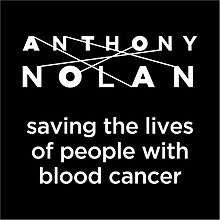Anthony Nolan
 | |
| Formation | 1974 |
|---|---|
| Legal status | Registered charity |
| Purpose | Health care in the UK |
| Location |
|
Region served | UK |
Chief Executive | Henny Braund |
| Website | AnthonyNolan.org |
Anthony Nolan is a UK charity that works in the areas of leukaemia and hematopoietic stem cell transplantation. It manages and recruits donors to the Anthony Nolan Register, which is part of an aligned registry that also includes the Welsh Bone Marrow Donor Registry, and the National Blood Service ran British Bone Marrow Registry. This aligned register is known as the Anthony Nolan & NHS Stem Cell Registry.[1] It also carries out research to help make bone marrow transplants more effective.[2]
History
The charity is named after Anthony Nolan (born 1971–died 1979), who did not suffer from leukaemia but from Wiskott-Aldrich syndrome, a rare inherited blood disorder.[3] It was founded by Anthony's mother Shirley Nolan (1942–2002) in 1974 as the Anthony Nolan Register.[3]
Initially based at the Westminster Children's Hospital, it moved to St Mary Abbot's Hospital in 1978 and to its present offices, laboratory and research institute in north London, in the grounds of the Royal Free Hospital. The charity was renamed in 2001 as the Anthony Nolan Trust.[3] and again in 2010 to Anthony Nolan.[3] In 2008 Anthony Nolan set up the UK's first dedicated cord blood bank, allowing mothers to safely donate the blood from their umbilical cord and placenta after they give birth,[4] the charity then use this blood in their stem cell transplants. In 2012 Anthony Nolan became the first stem cell register in the world to start recruiting 16-year-olds.[4]
Present Day
Today the trust register has over 500,000 potential donors on it.[4] One of the charity's main aims is to recruit more male donors, as they are the most likely to be chosen by doctors to donate, and are selected for 80% of donations.[5]
A student organisation operating in universities throughout the UK known as 'Marrow' works with Anthony Nolan to recruit potential donors to the register and raise awareness of the charity and blood cancers within universities and their local communities. It was set up in 1998 at Nottingham University and now operates in around 50 universities in the UK and worldwide.[6]
In 2014, Anthony Nolan was the official charity partner for the London Marathon.[7]
The Midland Metro has a tram named after Nolan.[8] Daniel De Gale (1987–2008), a leukaemia patient, inspired his mother Beverley and her partner, Orin Lewis, to set up the African-Caribbean Leukaemia Trust in June 1996. ACLT worked "in partnership with the ... Nolan Trust" to build the number of bone marrow donors, specifically of African, African Caribbean, and mixed parentage on the UK register.[9]
The organisation organizes several novel campaigns to increase the number of donors joining the registry. For example, it organised the Spit and Save a life campaign[10] in 2010 which featured Devaanshi Mehta (1996-2012), an aplastic anemia patient. During the campaign donors could join the registry and find out if they could save a life by simply giving a sample of their saliva.
See also
- John M. Goldman, who was involved with the charity for over 20 years.
- Professor John Raymond Hobbs, whose team set up the world's first bone marrow donor register.
- Professor Sydney Selwyn, who was closely involved with the treatment of Anthony Nolan.
References
- ↑ "NHS BLOOD AND TRANSPLANT SEPTEMBER 2013" (PDF). NHS Blood & Transplant. Retrieved 23 May 2014.
- ↑ "What we do". AnthonyNolan.org. Archived from the original on 15 July 2010. Retrieved 30 July 2010.
- 1 2 3 4 "Our History". AnthonyNolan.org. Archived from the original on 15 July 2010. Retrieved 30 July 2010.
- 1 2 3 "Our History". Anthony Nolan. Retrieved 23 May 2014.
- ↑ "FAQs". Anthony Nolan. Retrieved 23 May 2014.
- ↑ "Marrow". AnthonyNolan.org. Retrieved 23 December 2015.
- ↑ "Anthony Nolan named as official charity partner for the 2014 London Marathon". Third Sector. 2013-04-23. Retrieved 23 May 2014.
- ↑ "Zahier appeal brings boost to donor register". Telegraph & Argus. 21 May 2004. Retrieved 18 June 2008.
- ↑ Truman, Peter, "Leukaemia campaigner Daniel De Gale dies", Croydon Guardian, 9 October 2008; retrieved 18 February 2011.
- ↑ "Spit to save a life". AnthonyNolan.org. Retrieved 11 March 2013.